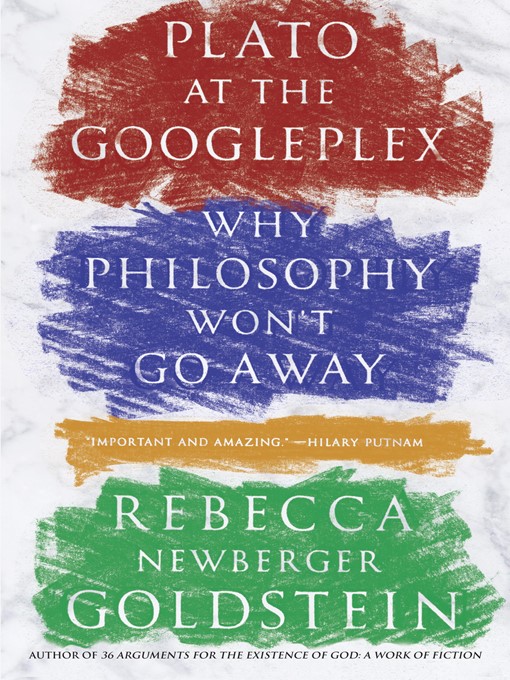Is philosophy obsolete? Are the ancient questions still relevant in the age of cosmology and neuroscience, not to mention crowd-sourcing and cable news? The acclaimed philosopher and novelist Rebecca Newberger Goldstein provides a dazzlingly original plunge into the drama of philosophy, revealing its hidden role in today’s debates on religion, morality, politics, and science.
At the origin of Western philosophy stands Plato, who got about as much wrong as one would expect from a thinker who lived 2,400 years ago. But Plato’s role in shaping philosophy was pivotal. On her way to considering the place of philosophy in our ongoing intellectual life, Goldstein tells a new story of its origin, re-envisioning the extraordinary culture that produced the man who produced philosophy.
But it is primarily the fate of philosophy that concerns her. Is the discipline no more than a way of biding our time until the scientists arrive on the scene? Have they already arrived? Does philosophy itself ever make progress? And if it does, why is so ancient a figure as Plato of any continuing relevance? Plato at the Googleplex is Goldstein’s startling investigation of these conundra. She interweaves her narrative with Plato’s own choice for bringing ideas to life—the dialogue.
Imagine that Plato came to life in the twenty-first century and embarked on a multicity speaking tour. How would he handle the host of a cable news program who denies there can be morality without religion? How would he mediate a debate between a Freudian psychoanalyst and a tiger mom on how to raise the perfect child? How would he answer a neuroscientist who, about to scan Plato’s brain, argues that science has definitively answered the questions of free will and moral agency? What would Plato make of Google, and of the idea that knowledge can be crowd-sourced rather than reasoned out by experts? With a philosopher’s depth and a novelist’s imagination and wit, Goldstein probes the deepest issues confronting us by allowing us to eavesdrop on Plato as he takes on the modern world.
(With black-and-white photographs throughout.)
- Read-Along eBooks for Children
- Get Hooked on a Series- eBook
- Winter Reading
- eBook Shorts: Your Favorite Stories, but Shorter
- Percy Jackson Collection
- Graphic Novels & Comics
- Romance in the Middle, Ages That Is
- Living on the Edge
- Is It True Dukes Have More Fun?
- Danielle Steel eBooks
- True Stories of World War II
- Biographies of Early Americans - eBooks
- Shifting Sands
- See all ebooks collections
- Read by the Author
- Short Stories for Short Commutes
- Have You Listened to the Most Popular Titles in the Collection?
- Winter Listening
- Percy Jackson Collection
- Animals on Audiobooks
- Audiobooks the Whole Family Will Enjoy...
- Audie Award Winners
- Oldies But Goodies
- Get Hooked on a Series- Audio
- Audiobooks You Might Have Missed
- Listen and Learn
- Listen & Learn: Science Nonfiction
- See all audiobooks collections
- 2024-2025 Great Stone Face Short List
- 2021 Library Reads
- 2022-2023 Great Stone Face Short List
- 2022-2023 Isinglass Award Short List
- 2022-2023 Flume Award Short List
- 2018-2022 Ladybug Award Nominees
- Romance Award Winners
- 2020 Library Reads
- Edgar Award Winners
- 2019 Library Reads
- Sci-Fi and Fantasy Award Winners
- 2018 Library Reads
- Book Shimmy Awards
- See all award winners collections
- Travel Magazines
- News Magazines
- Heath & Fitness Magazines
- Gardening and Outdoor Living Magazines
- Popular Magazines
- House and Home Magazines
- Tech and Gaming Picks
- Magazines for History Lovers
- Crafts & Hobbies Magazines
- Food & Wine Magazines
- Delving Into Your Devices
- Magazines for Science Enthusiasts
- Hobby magazines
- See all magazines collections




